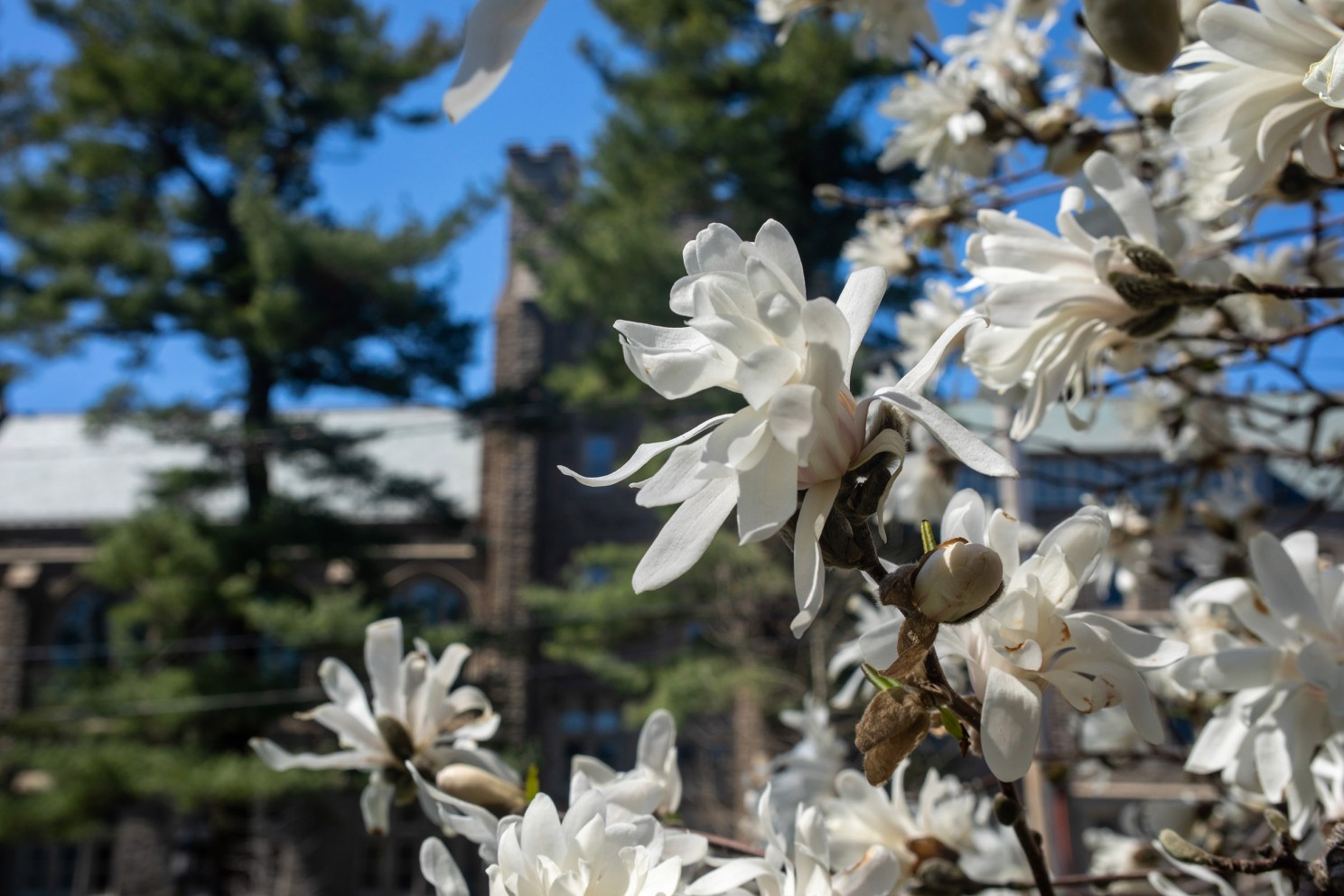Study of Psychedelics in Society and Culture announces funding recipients

Flowers highlight a beautiful spring day on Harvard Divinity School’s campus.
Kristie Welsh/Harvard Divinity School
Three major events, including Psychedelics Bootcamp 2024, to be hosted over summer
Celebrating its successful launch, the Study of Psychedelics in Society and Culture, an interdisciplinary effort that reaches across the Faculty of Arts and Sciences, Harvard Law School, and Harvard Divinity School, has named its first group of funding recipients.
The Mahindra Humanities Center announced the 16 projects, which will explore psychedelics and their many implications. The projects span disciplines and topics and will be spearheaded by faculty, graduate students, and undergraduates across the University. The Mahindra Center is collaborating with a similar initiative at the University of California Berkeley, which announced its first cohort of psychedelics researchers this week.
Among the projects is an anthropological study of psilocybin use in cancer patients at Dana-Farber Cancer Institute, a magazine exploring psychedelic art and literature (Elastic), an animated film exploring psychedelic use in later life (“Gray-Tripping”), and undergraduate research on a CIA-funded 1956 expedition to Mexico to collect psychotropic mushrooms. A full list of funded projects can be found on the newly launched Psychedelics Study website.
“Psychedelics are still often associated with the 1960s countercultures, but they have been recurrent in human experience, all across the world and throughout history,” said Bruno Carvalho, interim director of the Mahindra Humanities Center. “This first funding cycle reflects the exciting diversity of approaches to the study of psychedelics today, as well as our goal of fostering collaborations between different fields.”
During the past academic year, the Study of Psychedelics in Society and Culture has convened experts in discussion around far-reaching scholarship. At HDS’s Center for the Study of World Religions (CSWR), scholars explored the intersection of psychedelic study and religion and spirituality through more than a dozen events and research into how psychedelics have been used historically and culturally as tools for spiritual exploration and transformation.
The CSWR’s “Psychedelic Intersections: Cross-cultural Manifestations of the Sacred” conference, its new Psychedelics and Ethics series, and The Petrie-Flom Center for Health Law Policy, Biotechnology, and Bioethics at Harvard Law School led discussions while seeking to understand the moral implications of integrating psychedelics into therapeutic, spiritual, and cultural contexts.
“I am thrilled to see how psychedelics are encouraging the humanities to embrace concepts like ‘transcendence’ and ‘transformation,’ and to take religion and spirituality seriously. I am learning a great deal from our colleagues at the Law School about the complicated legal and regulatory landscape, and the ethical questions that arise,” said Charles Stang, Professor of Early Christian Thought at HDS and director of CSWR.
Building on the year’s momentum, Petrie-Flom plans to hold three major events this summer. In June, it will host “The Law and Policy of Psychedelic Medicine,” funded by a previous grant from the Saisei Foundation, Tim Ferris, and Matt Mullenweg. The conference will bring together more than 20 scholars to explore legal, ethical, and policy topics surrounding the challenges and opportunities resulting from the increased clinical research, private investment, and political interest in psychedelic medicines. The public kickoff event of the conference, “Speaking of Psychedelics: A Conversation with Ayelet Waldman,” will feature the novelist (HLS ’91) in conversation with Petrie-Flom’s Faculty Director I. Glenn Cohen and senior fellow Mason Marks.
At the end of July, Petrie-Flom will host Psychedelics Bootcamp 2024, an intensive training on legal, ethical, and policy issues surrounding psychedelics in medicine and society.
“The Petrie-Flom Center’s expanding work in psychedelics law and policy is intended to produce rigorous scholarship, provide education, and help the public and policymakers understand what’s at stake with potential therapeutic use of psychedelics. We are thrilled to work with a broad group of stakeholders, and look forward to thinking and learning together,” said Cohen.




